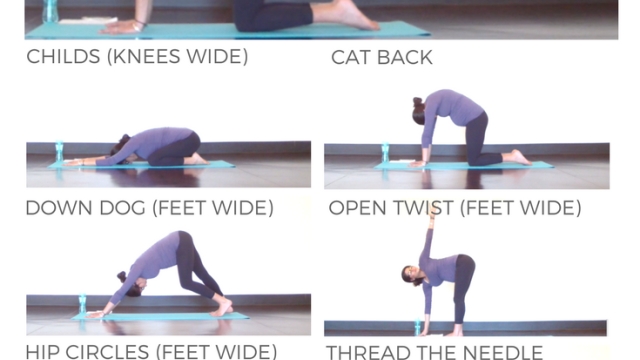Expectant mothers often find themselves caught up in the whirlwind of pregnancy, overwhelmed by physical and emotional changes. Amidst this beautiful chaos, the ancient practice of prenatal yoga emerges as a serene beacon of hope, offering a path to optimal wellbeing for both mother and baby. While pregnancy may come with its fair share of challenges, embarking on a prenatal yoga journey can provide a multitude of benefits, nurturing the mind, body, and spirit in exquisite harmony.
In the gentle embrace of prenatal yoga, beginners can find solace and empowerment. Asanas, or yoga postures, specifically tailored for mothers-to-be, offer a safe and nurturing environment for women of all fitness levels to embark on this transformative journey. With focuses on gentle stretches, deep breathing techniques, and relaxation exercises, prenatal yoga serves as a profound invitation to connect with the miraculous journey unfolding within. It opens doors to a world where expectant mothers can release tension, find strength, and cultivate a serene mindset as they prepare for the arrival of their precious bundle of joy.
Best Silk Bonnet
In the pages that follow, we will delve into the profound benefits of prenatal yoga, exploring how it can alleviate common discomforts, enhance physical strength and flexibility, promote emotional balance, and strengthen the bond between mother and baby. From nurturing the body to empowering the mind and spiraling towards a blissful pregnancy, prenatal yoga acts as a divine tool on this sacred journey of motherhood. So take a deep breath and allow yourself to embark on this Zen path, as we unravel the transformative power of prenatal yoga for both beginners and seasoned practitioners.
Benefits of Prenatal Yoga

Prenatal yoga offers numerous benefits for expectant mothers. Regular practice can help alleviate common discomforts during pregnancy, improve physical strength and flexibility, and promote emotional well-being. Here are some key advantages of incorporating prenatal yoga into your pregnancy journey:
Physical Wellness: Prenatal yoga focuses on gentle stretches and movements that are specifically tailored to accommodate the changes happening in your body. It can help alleviate back pain, sciatica, and other common discomforts by promoting better posture and alignment. Additionally, the practice improves circulation, which can reduce swelling and contribute to a healthier pregnancy overall.
Emotional Balance: Pregnancy often brings about a whirlwind of emotions. Prenatal yoga provides a safe and nurturing space for expectant mothers to connect with their bodies, babies, and inner selves. The mindfulness and breathing techniques practiced in prenatal yoga classes can help reduce anxiety, stress, and mood swings, fostering a sense of emotional stability and serenity.
Preparation for Birth: Prenatal yoga equips women with valuable tools and techniques to navigate the labor and delivery process. The practice emphasizes deep breathing, relaxation exercises, and visualization, which can assist in managing pain and promoting a calm birthing experience. Additionally, the strengthening and toning exercises help prepare the body for the physical demands of childbirth.
By embracing the practice of prenatal yoga, expectant mothers can enhance their physical well-being, cultivate emotional balance, and prepare both body and mind for the beautiful journey of bringing new life into the world.
Getting Started with Prenatal Yoga
Prenatal yoga is an excellent way for expecting mothers to stay active and find peace during pregnancy. Here, we will explore how to begin your journey into the world of prenatal yoga and reap its numerous benefits.
First and foremost, it’s important to find a qualified prenatal yoga instructor who specializes in working with pregnant women. Look for classes specifically designed for beginners, as they will provide a gentle introduction to the practice. A knowledgeable instructor will guide you through poses that are safe and suitable for your changing body, ensuring a comfortable and enjoyable experience.
Before attending your first class, make sure to check with your healthcare provider to ensure prenatal yoga is suitable for you. Once you receive the green light, invest in comfortable and stretchy clothing that allows freedom of movement. Additionally, bringing a yoga mat and a water bottle to stay hydrated throughout the session is recommended.
As a beginner, it’s essential to listen to your body and take breaks whenever needed. Prenatal yoga is all about adapting to your personal needs and capabilities. Remember to focus on deep, mindful breathing during each pose, which can help alleviate pregnancy discomfort and promote relaxation.
By following these simple steps, you’ll be well on your way to enjoying the benefits of prenatal yoga. From increasing flexibility and strength to reducing stress and anxiety, this practice can make your pregnancy journey more blissful and memorable.
Choosing the Best Prenatal Yoga Practice
When it comes to selecting the best prenatal yoga practice, there are a few key factors to consider. Firstly, it’s important to find a class or instructor that specializes in prenatal yoga. This ensures that they are knowledgeable about the specific needs and modifications required for pregnant women. Additionally, consider the location and schedule of the class to ensure it fits well into your routine.
Another aspect to consider is the level of experience offered. If you are a beginner, look for prenatal yoga classes catered towards beginners. These classes typically focus on gentle stretches and basic poses, allowing you to ease into the practice gradually. On the other hand, if you have previous yoga experience, you may feel comfortable joining a class that offers a more challenging practice.
Lastly, it can be beneficial to seek recommendations or read reviews from other pregnant women who have attended prenatal yoga classes. Hearing about their experiences and opinions can help you gauge the effectiveness and suitability of a particular class. Remember, every woman’s pregnancy journey is unique, so it’s essential to find a practice that aligns with your individual preferences and needs.
